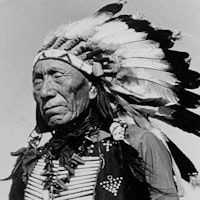I cured with the power that came through me. Of course, it was not I who cured…
I cured with the power that came through me. Of course, it was not I who cured…
Black Elk [Heȟáka Sápa]

Cured with the Power
Theme: Healing
I cured with the power that came through me. Of course, it was not I who cured, it was the power from the Outer World, the visions and the ceremonies had only made me like a hole through which the power could come to the two-leggeds. If I thought that I was doing it myself, the hole would close up and no power could come through. Then everything I could do would be foolish.
Heȟáka Sápa, commonly known as Black Elk, was born in December 1863 along the Little Powder River in what is now Wyoming. He was a member of the Oglala Lakota (Sioux) and a second cousin to the renowned war leader Crazy Horse. From a young age, Black Elk experienced profound spiritual visions that would shape his life and destiny. At the age of nine, during a severe illness, he had a vision in which he encountered the Six Grandfathers, spiritual beings who bestowed upon him gifts and powers, including the ability to heal. This vision set him on the path to becoming a wičháša wakȟáŋ, or holy man, a role he embraced throughout his life.
Black Elk's life was marked by significant historical events and personal transformations. He participated in the Battle of the Little Bighorn in 1876 and witnessed the tragic Wounded Knee Massacre in 1890. In the late 1880s, he traveled to Europe with Buffalo Bill's Wild West Show, where he sought to understand the ways of the white people. Upon returning to the United States, he became involved in the Ghost Dance movement, which aimed to restore the Native American way of life. Despite the suppression of this movement, Black Elk continued to serve his people as a healer and spiritual leader, blending traditional Lakota practices with his later conversion to Catholicism in 1904. He became a catechist, teaching Christianity while maintaining his Lakota spiritual beliefs.
Black Elk's legacy extends beyond his lifetime through his contributions to literature and spiritual teachings. His autobiographical accounts, shared with poet John G. Neihardt and anthropologist Joseph Epes Brown, were published in the influential works "Black Elk Speaks" and "The Sacred Pipe." These books have inspired generations and contributed to the revival of Native American culture and spirituality. Black Elk's ability to integrate his Lakota heritage with his Christian faith exemplifies his resilience and adaptability. His life and teachings continue to resonate, symbolizing a bridge between cultures and a testament to the enduring spirit of the Lakota people.
The Sacred Pipe
Black Elk, and Joseph Epes Brown. The Sacred Pipe: Black Elk’s Account of the Seven Rites of the Oglala Sioux. 1st pbk. ed., University of Oklahoma Press, 1989.

Black Elk [Heȟáka Sápa]
Theme: Healing

About This Black Elk [Heȟáka Sápa] Quotation [Commentary]
Black Elk’s statement, “I cured with the power that came through me. Of course, it was not I who cured,” highlights a deep understanding of healing. Black Elk [Heȟáka Sápa], a respected spiritual leader and healer of the Oglala Lakota Sioux, emphasizes that true healing comes from a source beyond the individual. He attributes his abilities to a divine power from the Outer World, underscoring his humility and recognition of his role as a conduit. This perspective invites us to consider the source of our own healing and the importance of humility in aiding others.
In the context passage, Black Elk elaborates, “the visions and the ceremonies had only made me like a hole through which the power could come to the two-leggeds.” This metaphor of being a vessel for divine power highlights the importance of maintaining a clear channel for spiritual energy. Black Elk believed that thinking he was the source of the healing would obstruct this channel, making his efforts ineffective. This insight is crucial for understanding how healers in many traditions view their work—not as personal achievements but as acts of service facilitated by a greater force.
Black Elk’s wisdom reminds us that true healing involves more than just technical knowledge or personal willpower; it requires a connection to something greater than ourselves. This connection is nurtured through practices like visions and ceremonies, aligning the healer with the divine source of healing. By acknowledging that “everything I could do would be foolish” without this connection, Black Elk teaches us the importance of humility and openness in the healing process. His words inspire us to recognize divine assistance in our healing journeys and to approach the act of healing with reverence and gratitude.
Joseph Epes Brown: Black Elk [Passage Excerpt]
Additional Black Elk Quotes
Resources
Related Quotes
Copyright © 2017 – 2026 LuminaryQuotes.com About Us